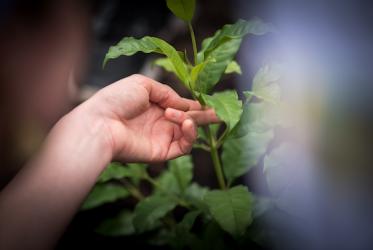Displaying 21 - 40 of 102
26 February 2020
Las iglesias deben usar su voz sobre el cambio climático
26 February 2020
CCIA-Tagung in Brisbane setzt Prioritäten für die Region Pazifik
19 February 2020
CCIA meets in Brisbane with focus on Pacific regional priorities
19 February 2020
Church of South India eco-ministry featured on UNESCO website
17 February 2020
Church response to Australian bushfires hinges on preparation
07 January 2020
La réponse des Églises aux feux de brousse est mûrement préparée
07 January 2020
New WCC “Eco Ambassadors” pledge to protect our ecology
06 January 2020
Eco-School promotes blue communities, green churches
19 November 2019
WCC Eco-School begins in Thailand
07 November 2019




